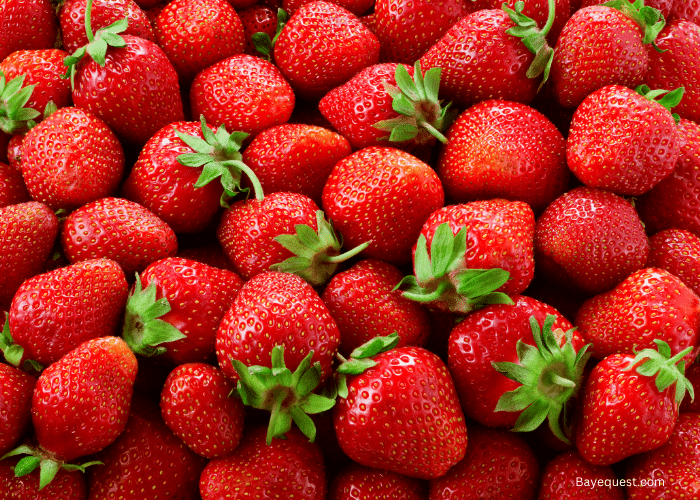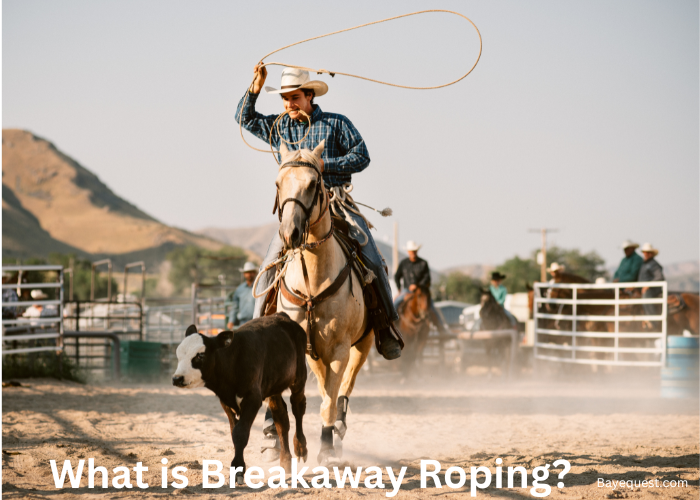When you think about treats for horses, apples, and carrots probably come to mind. But what about strawberries?
These juicy red berries are a favorite for many of us. It’s natural to wonder if our equine friends can enjoy them, too. In this post, we’ll dive into whether strawberries are a safe snack for horses.
We’ll explore their benefits and a few things to watch out for. Let’s find out together. Stick around as we unravel this sweet mystery.
Can Horses Have Strawberries? Key Takeaway
Yes, horses can have strawberries. Strawberries are safe and healthy for horses when given in moderation. They provide vitamins and antioxidants, but due to their sugar content, they should only be an occasional treat.
Can Horses Eat Strawberries?
Yes, horses can have strawberries. Strawberries are a delicious and nutritious treat for horses when given in moderation.
These berries are rich in antioxidants, vitamins, and fiber, which can benefit a horse’s health. However, you need to consider a few things:
- Moderation. Due to their high sugar content, strawberries should be fed in moderation.
- Preparation. Wash strawberries well to remove pesticides or dirt. Cut them into smaller pieces to prevent choking.
- Allergies and sensitivities. Like humans, horses can have allergies. Introduce strawberries slowly into their diet and watch for any adverse reactions.
How Many Strawberries Should a Horse Eat?
Moderation is key when it comes to feeding strawberries to horses. Although strawberries are safe for horses, they should be considered a treat rather than a diet staple.
Here’s a general guideline on how many strawberries a horse can eat:
Start small. If your horse has never had strawberries, try just one or two berries to see how it reacts. Watch for any signs of discomfort or allergic reactions.
As a treat. Once you know your horse can tolerate strawberries without issues, you can offer them as a treat. A good rule of thumb is to keep treats (all types, not just strawberries) to less than 10% of their daily diet. A handful of strawberries (about 4-6 berries) can be a suitable treat size for an average-sized horse.
Consider their overall diet and health. The amount can vary depending on the horse’s size, weight, and overall health. For overweight or diabetic horses, consult with a veterinarian before introducing or increasing the amount of any treat.
How Do Strawberries Benefit Horses?
Strawberries can offer several nutritional benefits to horses when included in a balanced diet. Here are some key advantages:
Vitamins and antioxidants. Strawberries are rich in vitamin C, an antioxidant that can help protect cells from damage. They also contain vitamins like B1, B6, and K, which support overall health.
Minerals. These berries provide essential minerals such as potassium and magnesium, which are important for maintaining healthy nerve and muscle function in horses.
Fiber. Strawberries contain dietary fiber, which aids in digestion and helps keep the gastrointestinal system running smoothly.
Hydration. Since strawberries are about 90% water, they can be a hydrating treat, especially on hot days or after exercise.
Low caloric content. Despite their sweetness, strawberries are relatively low in calories, making them a good treat option for horses that need to watch their caloric intake.
Palatability. Many horses enjoy the taste of strawberries, making them useful for training or bonding sessions.
Nutritional Content of Strawberries
| Nutrient | Amount |
| Calories | 32 kcal |
| Water | 91 g |
| Protein | 0.7 g |
| Carbohydrates | 7.7 g |
| Sugar | 4.9 g |
| Fiber | 2.0 g |
| Fat | 0.3 g |
| Vitamin C | 59.8 mg |
| Folate (Vit B9) | 24 µg |
| Potassium | 153 mg |
| Magnesium | 12 mg |
| Calcium | 16 mg |
Tips for Introducing Strawberries to Horses
Introducing strawberries to horses can be a delightful treat for them, but it should be done cautiously to ensure it suits their diet and health. Here are some tips for safely introducing strawberries to your horse:
Start small. Offer your horse just one or two small strawberries. This will allow you to monitor how they react to the new treat, particularly for any signs of digestive upset or allergic reactions.
Wash thoroughly. Always wash strawberries thoroughly to remove any chemicals, pesticides, or dirt that might be on the surface.
Cut into pieces. Cut the strawberries into smaller pieces before feeding them to prevent choking hazards, especially for smaller or older horses.
Monitor the reaction. After introducing strawberries, watch your horse for unusual behaviors or signs of discomfort. Allergic reactions can include hives, itchiness, or respiratory distress.
Feed in moderation. If your horse enjoys strawberries and shows no adverse effects, they can be added as a treat. Treats should not exceed 10% of a horse’s diet. A few strawberries a few times a week is ample.
Consider overall diet. Remember the total sugar intake from all sources in your horse’s diet, particularly if your horse is prone to conditions like laminitis or diabetes. Strawberries, while nutritious, do contain sugar.
Vary the treats. To provide nutritional balance and to keep mealtime interesting for your horse, offer a variety of treats alongside strawberries.
Consult your veterinarian. If you’re unsure how strawberries will fit into your horse’s diet due to health issues or dietary needs, it’s a good idea to consult your vet.
Considerations and Potential Risks of Horses Eating Strawberries
While strawberries can be a tasty treat for horses, there are considerations and potential risks to keep in mind before including them in your horse’s diet:
Sugar content. Strawberries contain natural sugars, which can concern horses with certain health conditions. Feed strawberries in moderation to avoid exacerbating these conditions.
Pesticides and chemicals. Commercially grown strawberries may be treated with pesticides and other chemicals. Thoroughly wash them before feeding to minimize the risk of ingesting harmful substances.
Choking hazard. Although smaller than many fruits, whole strawberries can still pose a choking risk, especially for smaller horses or those who eat quickly. Always cut them into smaller pieces to facilitate easier consumption.
Allergic reactions. Like any new food, strawberries can cause allergic reactions in some horses. Introduce them slowly and watch for any signs of allergic response.
Gastrointestinal upset. Introducing any new food, including strawberries, can lead to gastrointestinal upset. This may manifest as changes in stool consistency, colic, or gas. Monitor your horse closely when feeding strawberries for the first time.
Nutritional imbalance. Relying heavily on strawberries, can lead to nutritional imbalances if they displace more nutritionally complete feeds and forages. Ensure that treats are only a small part of the diet.
Seasonal availability. Depending on your location, strawberries may only be seasonally available. This inconsistency could affect your feeding routine.
Allergic Responses of Strawberries to Horses
While not very common, allergic responses in horses to strawberries can occur. When feeding strawberries to a horse for the first time, be vigilant and look for signs of an allergic reaction.
Here are some symptoms that might indicate an allergy:
Hives or urticaria. These are raised, itchy welts on the skin that can appear rapidly after eating an allergen. They may be seen anywhere on the body.
Swelling. You might notice swelling around the eyes, lips, or face, which is a common allergic reaction.
Itchiness. A horse might show signs of discomfort, such as rubbing against objects, due to itchiness resulting from an allergic reaction.
Respiratory issues. In more severe cases, an allergic reaction can cause respiratory distress. This may manifest as coughing, wheezing, or difficulty breathing.
Digestive upset. Although not always a direct sign of an allergic reaction, some horses might experience gastrointestinal discomfort.
Behavioral changes. A horse might become more lethargic or agitated due to the discomfort from an allergic reaction.
Alternatives to Strawberries for Horses
If strawberries aren’t suitable for your horse due to allergies or other concerns, you can offer plenty of other fruits and treats. Here are some healthy and safe alternatives that most horses will enjoy:
- Apples
- Carrots
- Bananas
- Watermelon
- Pears
- Celery
- Pumpkin
- Cucumbers
- Grapes
- Squash
What Other Berries Can Horses Eat?
Horses can safely enjoy a variety of berries besides strawberries. These can be a tasty treat in moderation and offer different nutrients and flavors.
Here are some berries that are generally safe for horses:
1. Blueberries. Rich in antioxidants and vitamins, blueberries are a healthy treat for horses. They’re small and easy to eat, making them a convenient snack.
2. Raspberries. These berries are low in sugar and high in fiber, making them a good choice for horses. Like blueberries, they also contain antioxidants that support overall health.
3. Blackberries. Similar to raspberries, blackberries are nutritious and have a sweet-tart flavor that many horses enjoy. They are also rich in vitamins and minerals.
4. Cranberries. Although they are quite tart, some horses may enjoy cranberries. They’re better received when dried and sweetened, but it’s best to offer them fresh and in moderation due to their natural acidity.
5. Mulberries. If available, mulberries can be a delightful treat. They’re soft and sweet, and you can feed them fresh from the tree.
6. Elderberries. These ones must be cooked to be safe, as raw elderberries and other parts of the elderberry plant are toxic.
FAQs
Can horses eat strawberry plants or leaves?
Horses should not eat strawberry plants or leaves. While the fruit is safe, the plants and leaves can contain compounds that might irritate horses.
Can horses eat strawberry tops?
Yes, horses can eat strawberry tops – the green leafy part and the small stem that remains after the fruit is picked. These parts are not harmful and can be a good use of the entire fruit, reducing waste. However, as with any new food, introduce them gradually and ensure they are clean and pesticide-free.
How often can horses eat strawberries?
Horses can eat strawberries as a treat in moderation. It’s safe to feed a few strawberries (such as a handful) a couple of times a week as part of a balanced diet. Ensure that treats do not exceed 10% of a horse’s overall daily intake.
Do Horses Eat Strawberries? Conclusion
Yes, horses can indeed enjoy strawberries. Just remember, like all good things, moderation is key. A few strawberries here and there can make for a delightful treat.
Wash them well, chop them up, and watch your horse enjoy this sweet snack. Be mindful of their overall diet and health conditions, and as always, watch out for any unusual reactions.
Who knew sharing a berry or two could add such a fun twist to your horse’s snack time? Here’s to many happy, healthy treat times ahead with your equine friend.








